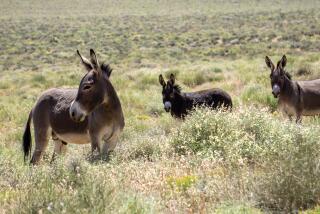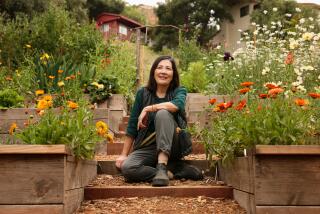She Has a Fine Way of Clarifying Misconceptions About Donkeys
- Share via
Kathryn Fine has always been an animal lover, so when she adopted six donkeys and housed them at her Fullerton home, it didn’t seem like a big deal.
The donkeys joined four dogs, four ducks, two geese, two starlings, two pigeons, 15 chickens, a cockatiel and a cockatoo.
But the donkeys brayed a lot, and neighbors thought the noise was unacceptable, which ultimately placed the matter before the Fullerton Planning Commission.
After the hearings, the commission ruled that because her property was only three-quarters of an acre, she could only keep two donkeys. At the same time the commission established a new equine zoning.
The ruling forced Fine to board four of her donkeys at another site in Fullerton. She visits them every weekend and on holidays..
She had traded a smaller tract home in the city for the current larger property she and her husband bought expressly to house the donkeys.
But Fine, the children’s librarian at the Brea Library and self-acknowledged activist, feels the ruling left her with a sense of accomplishment, even though the entire procedure was a stressful experience.
“This is an equine community, and the ruling established another legal horse property in the city,” boasted the active Audubon Society member and onetime Los Angeles Zoo docent. “I didn’t see this as a fight. It was defining what certain land should be used for.”
But perhaps more important to the transplanted Missourian, donkeys are finally getting some measure of publicity on the positive side.
Fine met her first donkey when she was a child at a gathering in Idyllwild. Though some people think of donkeys only in terms of stubbornness, Fine feels that they are “the most intelligent of animals who are very loving and trusting and very discerning.”
She said people should feel honored if a donkey takes a liking to them.
“They are very discerning who they give their love to,” said Fine, who points out that “although they hide it well, (donkeys) are bright animals.”
She claims that their stubbornness is misunderstood, considering their gentleness and their place in history.
“They are sure-footed beasts of burden who helped bring supplies and civilization to California,” Fine noted. “This is also an animal from the Bible. It was a donkey that brought Jesus and Mary to the stable.”
In modern times, she added, the hardy donkey is transporting goods and helping to bring civilization to Third World countries.
The Cal State Fullerton graduate, who also holds a master’s degree in library science from USC, blames bad press for the donkey’s reputation.
“Some of us are trying to reverse that erroneous belief,” she said.
Fine said she and her husband, Carl, were first introduced to the idea of caring for a donkey about six years ago, after a chance meeting on the bridle trail in Fullerton with a couple who had adopted a donkey from the Federal Bureau of Land Management.
It was named Bathsheba.
The couple told the Fines, who annually sponsor a Carl and Kathryn Fine Anti-Litter Award in Fullerton, that they really didn’t have the time or interest to care for the jenny in foal.
Kathryn Fine agreed to adopt Bathsheba.
Shortly after, Bathsheba had her foal, which was named Lavender.
“I took one look and fell in love,” Kathryn Fine said. “(Lavender) had long ears and long legs and had eyes that would melt your heart.”
More to Read
Sign up for Essential California
The most important California stories and recommendations in your inbox every morning.
You may occasionally receive promotional content from the Los Angeles Times.













